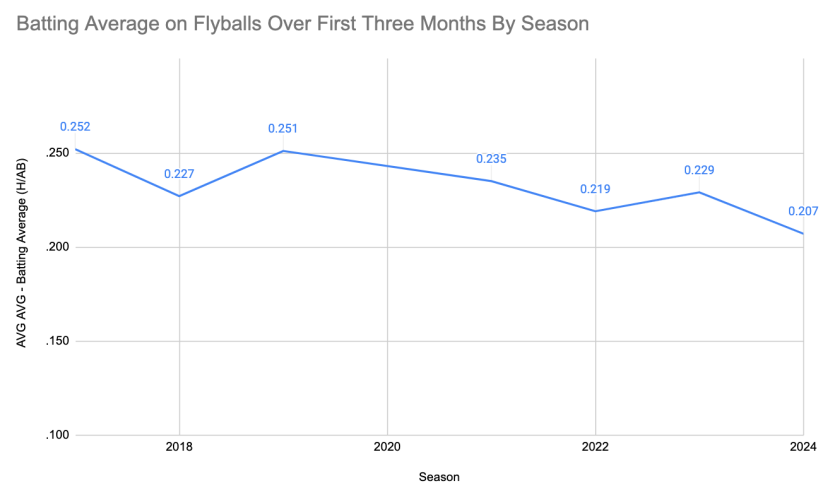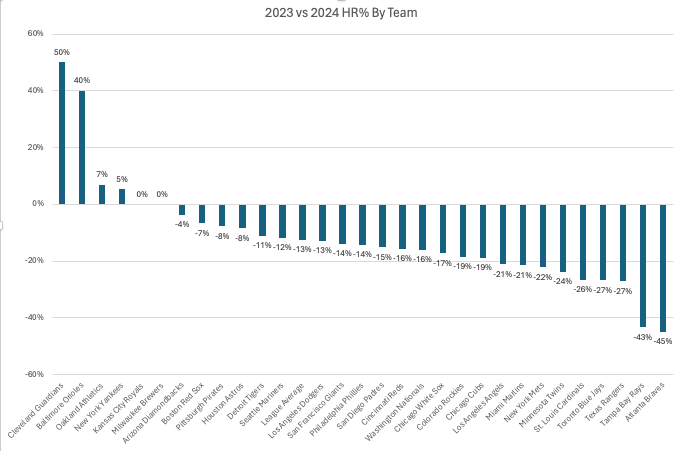This article is part of our Collette Calls series.
I have used this column over the past few weeks to look at specific players or skills, but I wish to take a more general approach this week and look at some different aspects of leaguewide offense on display through June 12th.
By this point of the season, you should recognize that we are no longer enjoying the 2023 run environment, despite what Wednesday's 17-9 score between Minnesota and Colorado (in Minneapolis) tells you. The home runs per contact continue to track at a 10 percent decline from the same time frame last season:
SEASON | AB | HR | K | HR/Contact |
|---|---|---|---|---|
thru 6/12/23 | 66,906 | 2272 | 17,018 | 4.55% |
thru 6/12/24 | 68,492 | 2113 | 17,006 | 4.10% |
I don't believe this is a baseball production issue, as I've stated on my weekly Saturday appearance on the RotoWire SiriusXM show (tune in Saturdays at 1:30 p.m. ET to hear me!). Instead, I believe something has changed in the pregame handling and storage of the baseballs which is preventing them from carrying as well as they did last season. Consider the average distance and exit velocities in the table below:
SEASON | AvgFly Barrel Dist | Avg Exit Velo | Avg Fly Dist | Avg Exit Velo on FB | Avg Pulled Fly Dist | Avg Exit Velo Pulled FB |
|---|---|---|---|---|---|---|
thru 6/12/23 | 393 ft | 103.9 | 315 ft | 92.3 | 339 ft | 95.4 |
thru 6/12/24 | 390 ft | 103.7 | 313 ft | 92.0 | 337 ft | 95.4 |
The baseballs are being struck with the same force, but each of those batted ball types is traveling two or three feet
I have used this column over the past few weeks to look at specific players or skills, but I wish to take a more general approach this week and look at some different aspects of leaguewide offense on display through June 12th.
By this point of the season, you should recognize that we are no longer enjoying the 2023 run environment, despite what Wednesday's 17-9 score between Minnesota and Colorado (in Minneapolis) tells you. The home runs per contact continue to track at a 10 percent decline from the same time frame last season:
SEASON | AB | HR | K | HR/Contact |
|---|---|---|---|---|
thru 6/12/23 | 66,906 | 2272 | 17,018 | 4.55% |
thru 6/12/24 | 68,492 | 2113 | 17,006 | 4.10% |
I don't believe this is a baseball production issue, as I've stated on my weekly Saturday appearance on the RotoWire SiriusXM show (tune in Saturdays at 1:30 p.m. ET to hear me!). Instead, I believe something has changed in the pregame handling and storage of the baseballs which is preventing them from carrying as well as they did last season. Consider the average distance and exit velocities in the table below:
SEASON | AvgFly Barrel Dist | Avg Exit Velo | Avg Fly Dist | Avg Exit Velo on FB | Avg Pulled Fly Dist | Avg Exit Velo Pulled FB |
|---|---|---|---|---|---|---|
thru 6/12/23 | 393 ft | 103.9 | 315 ft | 92.3 | 339 ft | 95.4 |
thru 6/12/24 | 390 ft | 103.7 | 313 ft | 92.0 | 337 ft | 95.4 |
The baseballs are being struck with the same force, but each of those batted ball types is traveling two or three feet less than they did in the early part of last season. This is particularly problematic for flyball hitters given the fact fewer balls are leaving the yard and teams have become even more adept in their outfield positioning. Just take a look at what has happened to batting averages on flyballs according to to the data from FanGraphs. This represents all flyballs in the first three months of the season dating back to 2017:

It should be noted that three lowest years for low batting average on flyballs in the first stanza of the season have come in years where the ball was not traveling as well as it had the previous season. That said, 2024 is off to the worst start yet, and it helps understand some of the struggles from hitters such as Leody Taveras, Corbin Carroll, Rowdy Tellez, Cedric Mullins, Randy Arozarena, Michael Harris II and Yandy Diaz, who all have batting averages below .150 on flyballs so far this season. They are having difficulty adjusting to the new environment for a variety of reasons, but then you always have your exceptions. Mookie Betts is hitting .188 on flyballs this season, but still maintains an overall .308 batting average because he smokes everything else and has hit 10 homers off those flyballs this season. I cannot even begin to explain the opposite situation in Jeimer Candelario, who is hitting .243 this season but has 11 homers and a .304 batting average on flyballs. Maybe mix in a line drive every now and then?
Then we have the matter of overall offense being down since we have fewer homers. Baseball Reference includes a stat labeled HR%, which is the percentage of plate appearances which result in a home run. This differs from HR/Contact, which in its simplest form is looking at homers when the ball is put into play. In 2023, 3.2 percent of all plate appearances resulted in a home run, while that rate has fallen to 2.8 percent this season. That represents a 12.5 percent drop in the number of plate appearances resulting in a home run, which is higher than the 10 percent drop we are seeing in the HR/Contact in 2024 compared to 2023. It gets worse when you look at it from a team context. Had we known this was how the season was going to play out, many of us would have drafted differently:

The physical changes to Progressive Field have been a widely discussed issue as many are stunned by the sudden turnaround in how the park is playing for homers. The HR Park Factors for the entirety of the years measured by BaseballSavant for Progressive Field has only been higher than the two stadiums on either side of San Francisco Bay. Even if we were to just focus on its three-year rolling average, Progressive Field still only finishes ahead of those same two stadiums. However, when we isolate how the stadium performs in 2024, Progressive Field has been the fourth-best environment for home runs, trailing only Petco Park, Dodger Stadium and Minute Maid Park. I am actually more impressed with how Baltimore has hit home runs this season considering the heavy hand Lord Walltimore imposes on right-handed hitters; OPACY has a HR park factor just a tick below league average for righties. Finally, can we applaud Oakland for doing what the team is doing on the field despite all the distractions and disasters happening around them? They have the third-best increase in homers year over year and are fifth in baseball with 80 homers on the season despite the cost-cutting measures of the front office:
TEAM | AB/HR | 2024 Payroll |
|---|---|---|
Baltimore Orioles | 21.8 | $100.9M |
New York Yankees | 22.6 | $308.2M |
Los Angeles Dodgers | 25.7 | $230.2M |
Houston Astros | 27.9 | $249.5M |
Oakland Athletics | 29.6 | $62.5M |
Philadelphia Phillies | 29.9 | $246.4M |
Seattle Mariners | 30.0 | $142.4M |
Cleveland Guardians | 30.0 | $99.8M |
Los Angeles Angels | 30.1 | $173.6M |
Minnesota Twins | 30.7 | $127.4M |
Now, here is where things get a little weird. Baseball Reference has a stat called Run Scoring Percentage (RS%) which tracks the percentage of times a baserunner eventually scores a run. The 2023 season saw 31 percent of baserunners come around to score, which was a slight increase from the 2022 season, when 30 percent of such runners scored. This season, even with home runs less common and with offense down across the board, 31 percent of baserunners have still managed to score despite the league-wide on-base percentage falling nine points from 2023. The league-wide success rate for stolen bases has held steady at just over 78 percent this season, which is a two-point drop from last year's record, but the attempt rate has also held at six percent higher than it was last season. The league is still on track to potentially exceed last year's stolen base total, as the 1,509 bases swiped so far this season represent 43.1 percent of last year's total while the league has played 42.4 percent of its schedule to date. Otherwise, things are in line with 2023, as the league's extra base taken rate is identical to last season.
In summary, the league has apparently come to grips with the fact the baseball isn't traveling as it did last year and is continuing to look for ways to generate offense with other strategies. Teams that were previously not built around the home run such as Cleveland, Kansas City and Baltimore are doing well while other clubs such as Atlanta, Tampa Bay and Texas are continuing to look for ways to generate runs, as those clubs find themselves in the bottom 50th percentile for offense just one season after they were the pace-setters of the league. I would advise fantasy managers to tune out any advice that things to normalize once the weather heats up, as this is the new norm. We're just over 42 percent of the way into the 2024 season, and any critiques of small sample size can be summarily dismissed. There is not going to be any single magical solution to fix any of your offensive statistical shortcomings, so you must continue to grind your lineups and maximize your plate appearances and whatever matchups the schedule presents to compile every homer, run, steal or RBI out there this summer.










